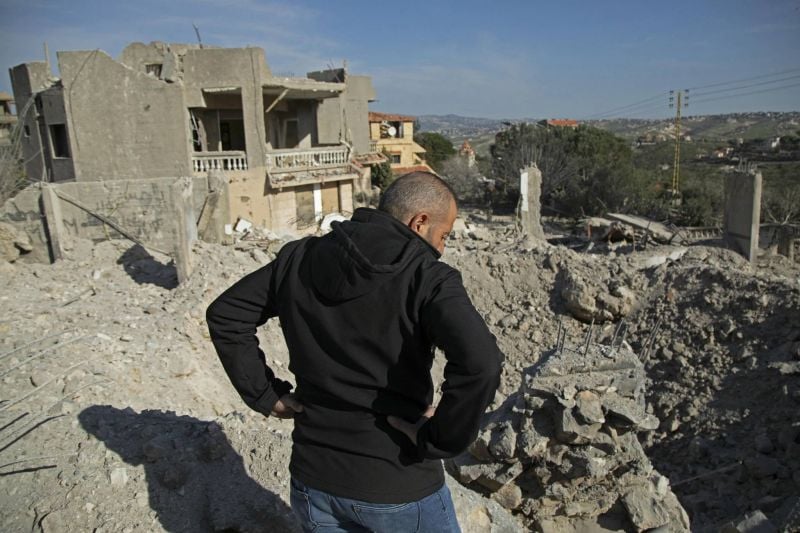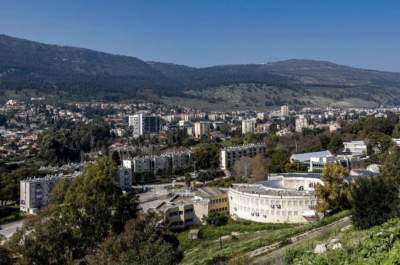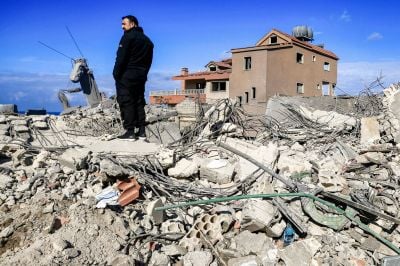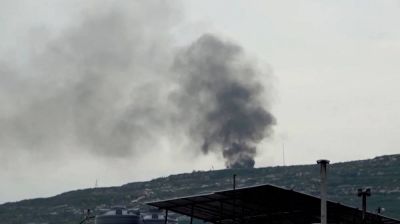
A resident inspects the damage due to Israeli bombardment in the southern Lebanese village of Khirbet Silm near the border on Feb. 28, 2024, amid ongoing cross-border tensions as fighting continues between Israel and Palestinian Hamas militants in the Gaza Strip. (Credit: Hassan Fneich/AFP)
BEIRUT — US officials are concerned that Israel is planning "a ground incursion into Lebanon that could be launched in the late spring or early summer if diplomatic efforts fail to push Hezbollah back from the northern border with Israel," CNN reported citing senior administration officials and officials familiar with the intelligence.
Israeli military operation in the coming months?
It is the first time since the beginning of the war between Israel and Hamas in October that US officials explicitly express their concerns over a potential Israeli ground incursion into Lebanon.
Since the start of the war in Gaza, Hezbollah and its allies have been targeting the Israeli army, which has retaliated by bombing Lebanon.
"We are operating in the assumption that an Israeli military operation is in the coming months," one senior Biden administration official told CNN. "Not necessarily imminently in the next few weeks but perhaps later this spring. An Israeli military operation is a distinct possibility."
Meanwhile, military and security sources in Lebanon and Israel told The National that Israel has planned for a war in South Lebanon to "remove Hezbollah from the border" and the militant group is preparing to face "all scenarios," including a ground invasion.
What about ongoing negotiations?
In the past few months, the US has been negotiating between Lebanon and Israel to prevent the conflict from flaring up. US envoy and senior energy advisor Amos Hochstein, who previously implemented the agreement on the maritime border between Lebanon and Israel in October 2022, is still trying to reach a diplomatic solution.
"I think what Israel is doing is they are raising this threat in the hope that there will be a negotiated agreement," added the senior official.
"Some Israeli officials suggest that it is more of an effort at creating a threat that they can utilize. Others speak of it more as a military necessity that’s going to happen."
Meanwhile, another Biden administration official told CNN that there is a group of officials in the Israeli government and military who are "in favor" of an incursion. He added that any incursion could lead to a "major, major escalation that we don’t even know the proportions of."
The Israeli embassy in Washington told CNN that "Israel will not return to the pre-war status quo in which Hezbollah poses a direct and immediate military threat to its security along the Israel-Lebanon border."
Israel has repeatedly stated that it is trying to reach a diplomatic solution so that inhabitants of northern Israel can return to their homes. Tens of thousands of Israeli civilians were evacuated from high-risk areas since the start of the war. Israeli officials have also been saying that if they can not accomplish this diplomatically, they will achieve it militarily.
Israel has started to strike deeper into Lebanon in recent weeks. Israel carried out an airstrike on an area near Baalbeck, eastern Lebanon, tried to assassinate a Hamas official in Jadra (Chouf) and struck the town of Ghazieh near Saida among other targets.
"There are fears this will grow to an expansive air campaign reaching much further north into populated areas of Lebanon and eventually grow to a ground component as well," another person familiar with the US intelligence told CNN.
"If Amos were to successfully negotiate a standoff arrangement, then the probability of a military operation later this year would decline considerably," the first administration official said. He added that "if Hezbollah is pushed back about 10 kilometers, that would take out some of the shorter-range munitions they’ve been using against Israel," according to CNN.
After a Gaza cease-fire
Despite ongoing negotiations to reach a cease-fire deal in Gaza, this does not necessarily mean that skirmishes will stop on the Lebanese-Israeli border if these negotiations succeed. Although Hezbollah would likely stop its attacks in the event of a Gaza cease-fire, Israeli Defense Minister Yoav Gallant said on Sunday that "even if there is a temporary truce in the South [with Hamas in Gaza, Israel] will increase the fire in the north independently, and will continue until the complete withdrawal of Hezbollah and the return of the residents to their homes." According to The National, "signs that a cease-fire might be imminent in Gaza have raised fears that Israel will turn its attention to south Lebanon."
Moreover, the first administration official told CNN that an agreement that simply pushes Hezbollah back from the border may also not be enough for Israel. A ground incursion "would give Israel a chance to mow the grass and destroy Hezbollah’s physical infrastructure in the south that would at least slow a future return to the border area."
The official added that if the invasion does not happen, the Lebanese army and the UNIFIL should fill the buffer zone.
Iranian green light to Hezbollah?
Meanwhile, an unconfirmed report published by the Arabic Post claimed that Iran gave Hezbollah the green light to escalate attacks against Israel in case Israel begins a ground invasion of Rafah, located in southern Gaza.
Israeli Prime Minister Benjamin Netanyahu has previously said that a ground invasion of Rafah, where nearly 1.5 million Palestinian civilians have sought refuge, is necessary to achieve "total victory" over Hamas.
A source in the Iranian Revolutionary Guard Corps (IRGC) told Arabic Post that the commander of the IRGC's Quds Force, Esmail Qaani, gave Hezbollah the green light in a meeting with Hezbollah's secretary-general, Hassan Nasrallah, held in Beirut on Monday. The source added that Nasrallah told Qaani that the Israeli attack is "likely to be very imminent, most likely in the month of Ramadan, or with Israel’s invasion of Rafah."


